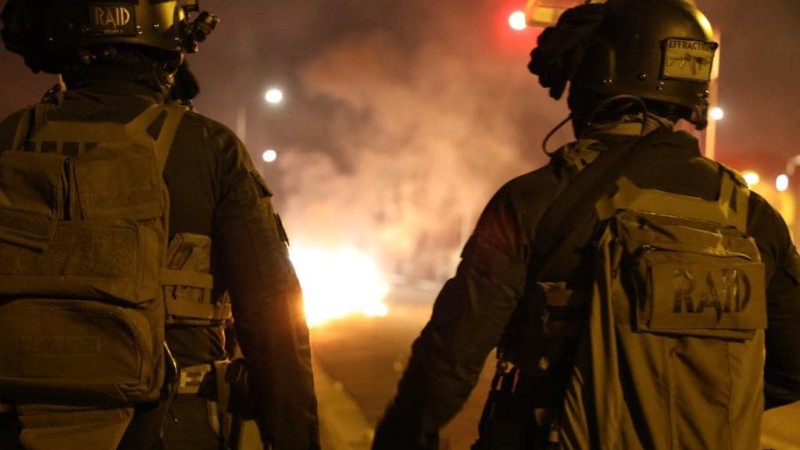Geopolitics
Why did France go up in flames?

Unfortunately France is not surprised by what happened last week. We are getting used to it, just like the USA is becoming accustomed to massive riots and lootings when a police officer kills an African-American - said Alexandre Mendel, French journalist, dealing with issues such as radicalization. For InfoSecurity24.pl Mendel agreed to comment on the recent events in France, which were associated with many outbreaks of violence and the spread of riots throughout the country.
Jacek Raubo: A wave of riots and violence broke out in France following the fatal shooting of a 17-year-old by a police officer. Is France surprised by the scale of the upheaval? How is it different from the riots of 2005?
Alexandre Mendel: Unfortunately France is not surprised by what happened last week. We are getting used to it, just like the USA is becoming accustomed to massive riots and lootings when a police officer kills an African-American. But it is true that things have changed somewhat since 2005. Smartphone videos that circulate on social media have a deep impact. Two videos from different angles were taken by passers-by when Nahel was shot by the police. People could immediately see that the policeman did not have an appropriate response to the driver's attitude (who was not threatening the police).
But the main difference compared to 2005 is that today all cities, even as small as Béziers or Troyes, are suffering from riots and lootings. In 2005 only major population centres had to deal with urban violence. Now this concerns all of France.
What is the current assessment of the state's actions against the riots? How do the French rate their uniformed services, including the police? Are there calls for change in the conduct of uniformed services, as was the case after the American riots?
Only the far left (Melenchon's party La France Insoumise, which is the main leftist party in France) is in favour of significant changes in police conduct. In 2017 a law was passed that allowed the use police to use firearms in legitimate cases of self-defence, e.g. when a driver fails to stop the vehicle when ordered or refuses to comply when arrested. Now, six years after this law was passed (actually under socialist president François Hollande!), the left wants to abolish it. In general, the police is very favourably viewed by the people. To give you an example, there is an ongoing fundraiser that was started on social media for the family of the police officer who is now in jail. In just 5 days they collected more than 1.5 million Euro. The work of the police during the riots was also greatly praised by the public opinion – no deaths, no blunders, although the atmosphere was extremely tense. Intellectuals ("gauche caviar" living in fancy neighbourhoods) can criticize the work of the police, though the silent majority approves it.
Can it really be said that the French state has withdrawn from some cities areas where no-go zones were created? This is being indicated by many radical voices in Poland when assessing contemporary France.
Yes, and it is not new. I have dozens of examples. Take the Northern Districts of Marseille, where some cités have been left to drug dealers, and where the authorities clearly ask the police not to proceed to control for "social peace order". In French we call this "acheter la paix sociale", buying social peace. This has created dozens of no-go zones, which are difficult to access by the fire brigades, where nurses and doctors cannot go without the consent of drug dealers... The only public service that is welcome is the Mail Service because of the welfare checks! Ten years ago, when I wrote about this in my books ("La France Djihadiste" and "Partition"), I was considered an extremist. Nowadays even the liberals admit there are no-go zones. It is taking time for us to finally open our eyes, but slowly we are becoming fully aware of what is happening in the "territoires perdus de la République", or "the lost territories of the Republic", as we call them.
Thinking about the riots in France, the significance of cultural and religious differences often comes up in Polish discussions. Do these issues constitute actual threats to state security, or are the combined phenomena of immigration, cultural assimilation and religious radicalism more important?
We have to deal with people who are French. Sometimes 3rd generation French. When their parents or grandparents came to France between the late 1960s and the 1980s to work for Renault or Peugeot, they did not integrate, but they were not violent. Their sons and grandsons are protesting because they feel that they are culturally excluded from society, left in ghettos in suburban areas with the worst schools and public services... Which was true at that time, but not anymore thanks to the implementation of various programmes of rehabilitation worth billions of Euros. They now have the best libraries (which often burn during riots), the finest sports equipment, good schools, etc.\ Liberal governments, particularly since François Mitterrand's term, have been calling them "victims". What does a victim do? They want to get revenge. Revenge for their parents, revenge because liberals (who need their votes... do not forget these people vote) always find social excuses for them.\ And what is better for them than radical Islamism to get their revenge on what they call "Colonial France"? Places where their culture, their language, their faith is celebrated... Combine this with the fact that Muslims do not accept the liberal vision of society (gay marriage, for example) and you have the worst possible combination, where one part of the society calls for them to play the role of victims, while radical Islam encourages them to fight the so-called Republican values.
Riots always result in increased police attention. Do criminal groups, and maybe even terrorist structures operating in France, want to incite and prolong tensions in the streets?
I have visited about 80 radical mosques in France. It might surprise you, but I would say that the terrorist structures in France do not want long term tensions. If a riot occurs, the police (who have heavy equipment available) will come to their neighbourhoods. It is not good for the radical Islamic business. These people operate in secret. The no-go zones are perfect places for them to operate in relative "peace". In times of tension "urban guerillas" have to hide their business of hate. They might appreciate that the 3rd generation of migrants hate France, that is good news for them. They do not like the mess they create when they see dozens of police trucks entering the cités (which they usually never do in times of "paix sociale").
In Poland the reasons behind the outbreak of violence on such a scale are widely commented on. Above all else, the lack of a good immigration policy in France is being pointed out. This is of course driven by a wider debate in Europe about migration and EU policy. However, does France really need to reform its approach to migration? Perhaps it is an issue of social economics and education?
Talking about immigration in France is, in my opinion, complete nonsense. I want to emphasize the fact that these rioters are often the 3rd generation of migrants. Their parents were born in France, so were many of their grandparents. This does not mean that we have to import more of them to create more cultural and social clashes... But what can we do with the current generation? Deport them to countries where they never set foot in? Some of them have dual citizenship, like Nahel, the kid that was shot by the police, who was Franco-Algerian, but his parents were French citizens. What we have to do is to finally recognize that our integration model is a failure. You can integrate people that live far from the French reality, who still speak Arabic after so many years in France and who go to mosques that are often controlled by Middle-Eastern countries or by Algeria, where they are told to reject and hate Western values. In addition, it is time for France to stop social support for them. If they do not like us, why do we keep giving them so many social benefits? Poland's policy, of a working class immigration, with a selection of migrants, is the best approach. Unfortunately for us it is too late. Please Poland, learn from the last 40 years of migration in France and do not repeat the same mistakes.
Finally, I must ask about a matter that also arouses emotions from the perspective of the Polish assessment of the current events in France. Of course we are talking about the possibility of the riots being stimulated by the Russians in a fashion similar to events in Spanish Catalonia. Is such a possibility even being considered in France?
Not that I know of. It is very unlikely that the Russians are fuelling the riots in France. It is true that in the past the Chechens might have played a bigger role in some suburbs (notably in Toulouse) but not for political reasons, but in order to control the drug business.
However, the Russian media played a very important role during the "yellow vest" movement, exaggerating the importance of the protests and feeding conspiracy theories about Macron's government. It is in their interest to show a Western country experiencing trouble at home, like we did last week. But these outlets, such as RT France or Sputnik, are now closed. The saddest thing is that we do not even need the Russian expertise to create our own mess!
Alexandre Mendel - French journalist dealing with issues such as radicalization. His book received wide publicity. "Partition: Chronique de la sécession islamiste en France" articulates the increase in problems resulting from the growth of Islamism in France and its doctrinaires taking over the hearts and minds of many citizens. He is also the author of another item, referring to the threats of radical Islamist ideology, i.e., "La France Djihadiste."
